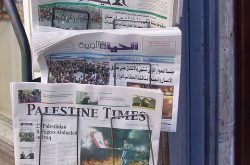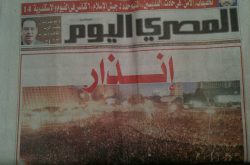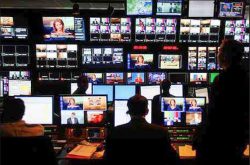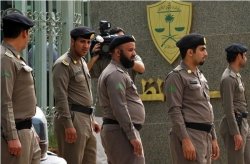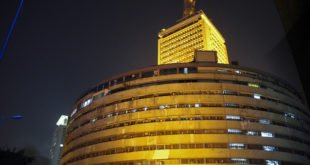Well before social media’s celebrated role in the uprisings of the Arab Spring, Mohamed Ben Moussa argues, the Internet was shaping collective action and political advocacy in Muslim-majority societies in important ways. Looking at Moroccan social movements’ framing of the 2009 Gaza war online, Ben Moussa details how the use of the Internet shapes their structure, boundaries and mobilization capacity.
Read More »Research Articles
Palestine’s Occupied Fourth Estate: An Inside Look at the Work Lives of Palestinian Print Journalists
In a study of three Palestinian newspapers, Miriam Berger identifies both internal and external pressures that profoundly limit the autonomy and development of Palestinian print journalism. In-depth interviews with Palestinian journalists and a focus on their work conditions reveal untold stories about the obstacles and red lines faced on a daily basis.
Read More »Is the Egyptian Press Ready for Democracy? Evaluating Newspaper Coverage as an Indicator of Democratization
Noah Rayman performs a quantitative textual analysis of pre- and post-revolution news coverage in the Egyptian independent newspaper Al-Masry Al-Youm. He finds that the extent of the paper’s post-revolutionary political coverage and social engagement indicate that Egyptian society and media is progressing on the path to democratization, despite the fact that qualitative analysis paints a less optimistic picture.
Read More »Twitter and Tyrants: New Media and its Effects on Sovereignty in the Middle East
Reviewing the role of new media in the Arab uprisings, Wiebke Lamer considers both its potential and its limitations in undermining authoritarian regimes. She concludes that over the long term, new media’s greatest impact may be in strengthening civil society and facilitating non-state actors.
Read More »Western Reporting in the Middle East: The Dilemma of Local Arab Reportersd
Salah Al-Nasrawi reflects on the hiring practices and work conditions of native Arab reporters employed by international media organizations with offices in the Middle East. He exposes an unregulated and often inequitable environment that stifles the development of local Arab journalism and he calls for a public debate on the issue.
Read More »Private Satellite Channels in Egypt: The Relationship between Ownership and Editorial Policy
Television producer Mohamed Nasser calls Egypt’s privately owned satellite channels a threat to the goals of the revolution and little better than their state-owned counterparts. He proposes a series of reforms, including legislation to separate ownership and management.
Read More »Repetition and Ideology in Nasrallah’s Political Speeches
El Mustapha Lahlali examines the ideological function of lexical repetition in two political speeches of Hizbollah leader Hassan Nasrallah, illustrating the ways that Nasrallah employs this rhetorical device to further his ideological agenda and political strategies.
Read More »Al Jazeera Television: Rhetoric of Deflection
Mahmoud R. Al-Sadi analyzes the “anti-establishment” discourse of Al Jazeera host Faisal al-Qasim, revealing a complex rhetorical style that deflects Arab radicalism, nudges viewers towards the pragmatism of Qatar’s foreign policy, and thus serves to reinvent Arab autocracy.
Read More »Saudi Arabia, Egypt, and the Social Media Moment
Nadav Samin looks at the uprising in Egypt from the perspective of Saudi Arabia where an online attempt to initiate nationwide protest in March 2011 met with disinterest from a sector of the digital community. An assessment of social media’s role in the regional uprisings, he argues, must not overlook its ability to reinforce and amplify conservativism in some contexts.
Read More »The Scene of the Crime: October 9th, Maspero, and Egyptian Journalism after the Revolution
In a piece of literary reportage, Maurice Chammah explores media coverage of the violence at Egypt’s state-television headquarters on October 9, 2011, illustrating the growing gap between state-owned and independent media and raising concerns about the blurring line between independent journalists and activists in post-revolution Egypt.
Read More » Arab Media & Society The Arab Media Hub
Arab Media & Society The Arab Media Hub

